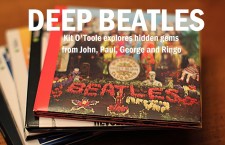As a composer, George Harrison developed his craft at an astoundingly rapid pace. Compare his first effort, 1963’s “Don’t Bother Me,” with his sophisticated contributions to Abbey Road: “Here Comes the Sun” and “Something.”
In just five years, Harrison established himself as a first-class songwriter every bit as talented as his gifted bandmates John Lennon and Paul McCartney. Yet Harrison later disdained his debut moment, dubbing it as not a “particularly good song” and failing to include it on subsequent setlists.
Is “Don’t Bother Me” worth such a dismissal? A closer examination reveals its importance in the Harrison catalog.
Sickness inspired the song; while on a 1963 tour in Bournemouth, England, Harrison fell under the weather. Convalescing at the Bournemouth hotel, Harrison challenged himself to write a track for the next Beatles album. Written as a reaction to his illness as well as his vanishing privacy (due to Beatlemania), “Don’t Bother Me” stands as Harrison’s first attempt at writing a song for his own voice.
As McCartney explained in Anthology, he and Lennon first wrote songs for Harrison and Ringo Starr to showcase their voices. “A lot of the girls were mad on him, so we always wanted to give him at least one track,” McCartney said. “Then George started to catch on: ‘Why should you write my songs?’ And he started writing his own.”
After recording very basic demos in his hotel room, Harrison brought the song to Abbey Road Studios for the With the Beatles sessions on September 11, 1963 After a very long day of laying down tracks for “I Wanna Be Your Man,” “Little Child,” “All I’ve Got to Do,” and “Not A Second Time,” the Beatles began work on the track. They recorded seven takes — three of which were overdubs — but elected to scrap them and try again the next day.
Several more tracks were recorded, as well as messages for Australian radio stations, before they finally attempted “Don’t Bother Me” once more. They recorded ten more takes: four of the basic track and six overdubs. Basic track take 13 was deemed best, and overdubs from take 15 featuring a secondary Harrison lead vocal, McCartney on woodblock, Lennon on tambourine, and Starr on Arabian bongos were used. Producer George Martin and engineer Norman Smith finished mono mixes of “Don’t Bother Me” on September 30, 1963, and With the Beatles finally hit store shelves less than two months later.
“Don’t Bother Me” contains two important elements that would reappear in several Beatles songs: the tempo and the complex subject matter. Since their Hamburg days, the Beatles were fascinated with incorporating rhythms not typical of rock music. They particularly enjoyed Latin percussion, as evident on “Besame Mucho” and “P.S. I Love You,” as well as later songs such as “And I Love Her” and “I Feel Fine.”
While this track may not represent the Beatles’ first attempt at integrating world music with rock, it stands as Harrison’s earliest venture into international sounds that would permeate much of his subsequent Beatles compositions as well as solo work. Here, Latin rhythms are established through McCartney and Starr’s catchy percussion; these ingredients, along with Harrison’s piercing lead guitar, distinguish “Don’t Bother Me” from other With the Beatles tracks.
Another key characteristic that “Don’t Bother Me” foreshadows is Harrison’s biting lyrics. His overt pessimism on the track marks a departure from early Beatles material. Although Harrison penned tender love songs, he returned to his world-weary, darkly humorous wordplay in songs such as “Only A Nothern Song,” “Taxman,” and “Piggies” along with solo tracks like “This Song,” “Sue Me, Sue You Blues,” and “Devil’s Radio.”
Here, Harrison directs his venom not only at an ex-lover, but at overzealous fans and the press. “Go away, leave me alone, don’t bother me,” he snarls. “I’ve got no time for you right now.” A hint of romance enters the picture when he croons the bridge: “I know I’ll never be the same if I don’t get her back again, because I know she’ll always be the only girl for me.” He demonstrates some vocal versatility on these lines, hitting higher notes than on previous cuts.
After his early effort, Harrison would rapidly mature as a songwriter; therefore “Don’t Bother Me” symbolizes an important stage in his artistic development. In 1980, Harrison reflected on his first song: “I don’t think it’s a particularly good song. … It mightn’t even be a song at all, but at least it showed me that all I needed to do was keep on writing, and then maybe eventually I would write something good.”
“Don’t Bother Me” is the first step toward reaching his ultimate goal. Its brief inclusion in A Hard Day’s Night also ensures its longevity.
- The Rescued Early Paul McCartney Song That Completed ‘Beatles For Sale’ - December 4, 2024
- A Rare Beatles Cover Proves John Lennon Was Wrong About His Voice - November 26, 2024
- How John Lennon Came Roaring Back on the Beatles’ White Album - November 22, 2023


